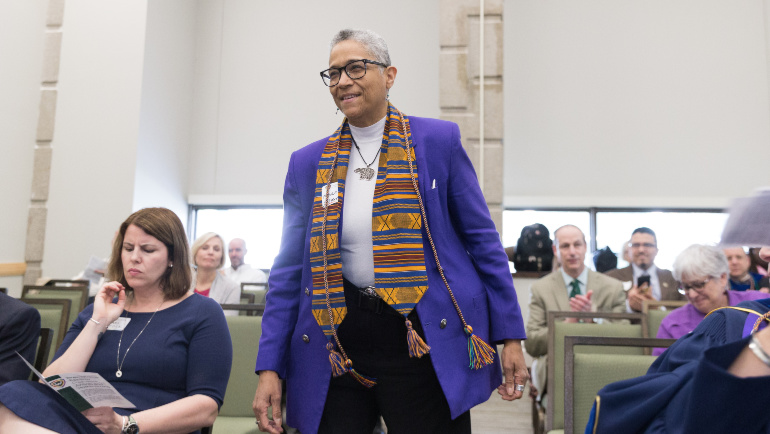
Marquita Chamblee concedes that, whether in education, among nonprofits or within the corporate ranks, jobs like hers aren’t usually created when things go well. The chief diversity officer for Wayne State University, Chamblee recognizes that institutions — be they colleges, nonprofits or corporations — typically turn to folks like her in times of serious need.
“Look around the country,” said Chamblee, who is also the university’s associate provost for diversity and inclusion. “You’ll find that a large percentage of chief diversity officers were hired because something was going on that was wrong that needed to be addressed.”
When President M. Roy Wilson hired Chamblee in February 2015, his mandate to her wasn’t much different: Help the university not only more effectively pursue its diversity mission, but also ensure that those efforts translate into improved academic performance, especially among African Americans and other students of color.
Nearly four years since she came on board, Chamblee, who leads the Office of Diversity and Inclusion (ODI) and is a valuable contributor to the university’s ongoing student success initiative, is seeing substantial results. The university’s graduation rate has nearly doubled over the past six years, increasing from 26 to 47 percent. Moreover, gains have been especially strong among students of color as well as first-generation and low-income students.
A key component of these successes has been the Office of Multicultural Student Engagement (OMSE), which is headed by director Leo Savala and overseen by Chamblee’s ODI. Among other efforts, OMSE has created learning communities such as The Network and Rise, which are aimed at male and female students of color, respectively. The learning communities have not only helped ease students’ transition into college, but have also provided critical academic and social support. OMSE has also helped sponsor a series of celebrations, lectures and other events.
“We work on creating a sense of belonging,” said Savala. “It’s not that students don’t feel safe in other places on campus, but I think students come to our office and see we have a nice quiet study space and some computers in there where they can do some of their work. We have a variety of discussions about issues they care about. Students can come up and talk about issues, brainstorm ideas, all of that. They just see it as a space they can be their authentic selves, and it’s OK to do that.”
Although OMSE’s work centers on students, ODI boasts a reach that can be felt across the entire campus. For instance, Chamblee’s office has put together numerous programs aimed at opening up dialogue about race, gender, sexual orientation and other issues. Over the past two years, the office has hosted a series of events to recognize the National Day of Racial Healing. And in 2018, ODI conducted a university-wide climate survey to gauge feelings about diversity, bias and other matters.
Further, Chamblee’s office also helped revitalize the once-dormant Black Faculty Staff Association (BFSA) and is aiding in the development of similar support groups for Latino and LGBTQ faculty on campus.
“Early in my tenure, I asked some African American colleagues, ‘Do you have a black faculty and staff association?’” Chamblee recalled. “Someone said there used to be something but it was no longer functioning. So when I got here, one of the high priorities for me was, if we’re going to support black students, we needed to reach out to and support black staff and faculty.
“The very first meeting we had, we invited everybody who was black on campus. We had about 200 to 250 people show up at this reception. The energy in the room was like Wow, look at us. The BFSA still young and figuring out what they want to do, but now there’s a mechanism for black faculty and staff to have a voice that connects them through this office to the president.”
Moving forward, Chamblee said, she hopes to work more closely with alumni of color to further open channels of communication between the campus and the city at large.
“I want to be sure that Detroiters know who we are,” she said. “We want to make sure we’re doing a good job of letting our communities in general, and communities of color in particular, know what’s happening here around some of these issues. I’ve said many times to people, ‘If we don’t control the narrative, the narrative will control us.’ There are still misperceptions in the community that continue to hurt us. What some folks aren’t aware of is that there are actually concerted efforts designed specifically to support student, staff and faculty success that may not have been here before.”
And for proof, they need look no further than the chief diversity officer herself.
